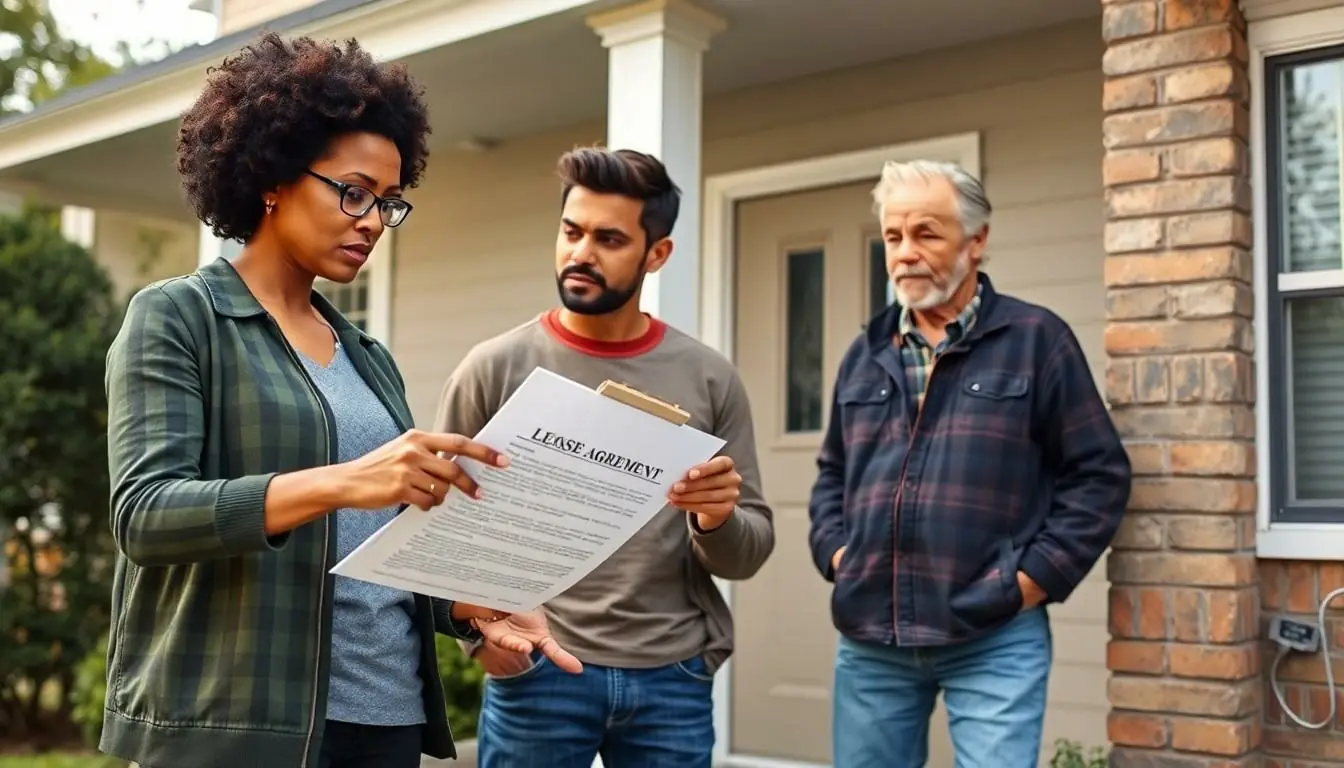Navigating the world of landlord-tenant law in Pennsylvania can feel like trying to solve a Rubik’s Cube blindfolded. With a mix of rights, responsibilities, and regulations, it’s easy to get tangled up in the legal jargon. Whether you’re a landlord looking to fill your rental with the perfect tenant or a tenant trying to understand your rights, knowing the ins and outs of these laws can save you a lot of headaches—and maybe even a few dollars.
Table of Contents
ToggleOverview of Landlord Tenant Law PA
Landlord-tenant law in Pennsylvania governs the relationship between property owners and renters. Regulations define both parties’ rights and obligations. Key elements include lease agreements, security deposits, property maintenance, and eviction processes.
Pennsylvania law requires written leases to be clear and concise. These agreements outline terms such as rent amount, payment date, and lease duration. In addition, security deposit rules dictate that landlords may collect a deposit equal to one or two months’ rent, depending on the lease length.
Property maintenance responsibilities fall predominantly on landlords. They must ensure the premises meet health and safety codes. Tenants share a duty to keep the property clean and to report maintenance issues promptly.
Eviction processes in Pennsylvania involve specific legal steps. Landlords must provide written notice before commencing eviction, typically giving a 10-day warning for non-payment of rent. Courts handle disputes if tenants contest an eviction notice.
Rights regarding retaliation are also essential. Landlords cannot retaliate against tenants for exercising their legal rights, such as reporting unsafe living conditions. This protection encourages tenants to speak up without fear of consequences.
Understanding landlord-tenant law helps prevent conflicts. Both parties benefit from knowing their rights and obligations. Engaging with local legal resources can provide additional clarity in specific situations.
Rights and Responsibilities of Landlords

Landlords in Pennsylvania hold specific rights and responsibilities essential for maintaining a balanced rental relationship. Understanding these aspects can improve interactions with tenants and ensure legal compliance.
Maintenance and Repairs
Landlords must ensure properties meet health and safety standards. Responsibilities include making necessary repairs within a reasonable timeframe. For example, responding to plumbing issues within 24 hours prevents further damage. Regular maintenance checks can also identify potential problems early. Tenants must report issues promptly to facilitate timely repairs. Documentation of repair requests can serve as evidence in disputes. Maintaining clear communication lines with tenants supports a positive renting experience.
Security Deposits
Landlords can collect a security deposit up to two months’ rent in Pennsylvania. Laws dictate that this deposit must be kept in an interest-bearing account. Upon lease termination, landlords must return the deposit within 30 days, deducting only for legitimate damages or unpaid rent. Providing an itemized list of deductions is necessary to avoid misunderstandings. Tenants should understand their rights regarding deposits, including the ability to dispute unfair deductions. Following these regulations helps maintain trust between landlords and tenants while minimizing potential legal issues.
Rights and Responsibilities of Tenants
Understanding tenant rights is essential for a harmonious rental experience. Tenants hold specific responsibilities and rights under Pennsylvania law that foster mutual respect and clarity.
Rent Payments
Timely rent payments stand as a core responsibility for tenants. Payments are typically due on a specified date each month, as outlined in the lease. Delays can lead to late fees, evictions, or breaches of contract. Tenants must keep records of payments, including receipts or bank statements, to protect themselves if disputes arise. Knowledge of the exact rent amount is crucial. Tenants should communicate promptly with landlords regarding any issues affecting their ability to pay rent.
Termination of Lease
Terminating a lease involves adhering to specific legal requirements. In Pennsylvania, tenants must provide written notice to landlords, typically 30 days, unless otherwise stated in the lease. Early termination may incur penalties based on lease terms. Moreover, tenants retain the right to a fair return of their security deposit, assuming no damages beyond normal wear and tear occur. Understanding the termination process ensures compliance with laws and protects tenant rights against unjust evictions and potential disputes.
Common Issues in Landlord Tenant Law PA
Many disputes arise in landlord-tenant relationships. Understanding these issues is vital for both parties.
Evictions
Evictions often stem from nonpayment of rent. Landlords must follow legal protocols, providing written notice before initiating the eviction process. This notice must specify the reason for eviction and grant a grace period for tenants to rectify the situation. Courts typically require landlords to prove they adhered to all notice requirements. Tenants can contest evictions by demonstrating compliance with lease obligations or disputing the eviction reason. It’s important for both parties to maintain clear communication throughout this process to avoid misunderstandings.
Discrimination
Discrimination claims can complicate landlord-tenant relationships significantly. Under the Fair Housing Act, landlords cannot discriminate based on race, color, religion, sex, national origin, familial status, or disability. Tenants facing discrimination should document occurrences and communicate with local housing authorities for support. Landlords, to mitigate risks, must implement fair rental practices and ensure all applications receive equal treatment. Understanding these guidelines fosters a fairer renting environment and minimizes potential legal conflicts.
Resources for Landlords and Tenants
Landlords and tenants in Pennsylvania can utilize various resources to navigate the complex landscape of landlord-tenant law. These resources provide essential information that can help prevent misunderstandings and conflicts.
Legal Aid Organizations
Legal aid organizations play a vital role in assisting landlords and tenants with legal issues. He or she can access services from local groups that offer free or low-cost legal assistance. Organizations like the Legal Aid of Southeastern Pennsylvania provide support in housing-related matters, including evictions and security deposit disputes. They ensure that individuals understand their rights and responsibilities. Referrals to attorneys specializing in landlord-tenant law may also be available.
Online Resources
Online resources provide valuable guidance for both landlords and tenants. Websites such as the Pennsylvania Bar Association and the Pennsylvania Housing Finance Agency offer comprehensive information on laws, regulations, and best practices. Landlords can find templates for leases and guidance on rental agreement clauses. Tenants, on the other hand, can learn about their rights regarding habitability and lease termination. For quick reference, the U.S. Department of Housing and Urban Development also provides updates on housing policies and tenant rights. These online platforms serve as accessible tools for understanding legal frameworks.
Navigating landlord-tenant law in Pennsylvania requires a solid understanding of rights and responsibilities. Both parties benefit from clear communication and adherence to legal guidelines. By familiarizing themselves with the intricacies of leases, security deposits, and maintenance obligations, landlords and tenants can foster a more harmonious relationship.
Utilizing available resources ensures that both sides are informed and prepared to address any issues that arise. Whether facing eviction or discrimination, understanding the law can empower tenants and landlords alike. It’s essential to stay proactive and seek assistance when needed to maintain a positive renting experience in Pennsylvania.





